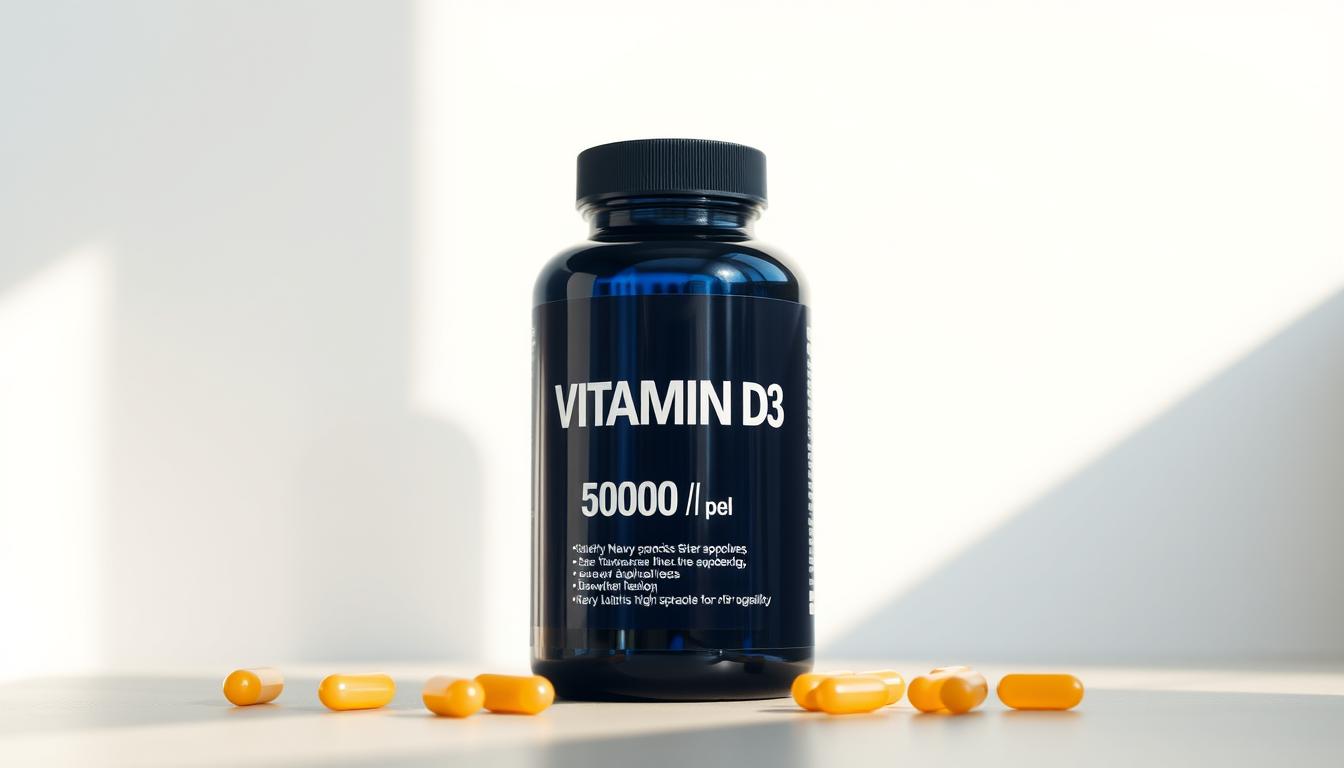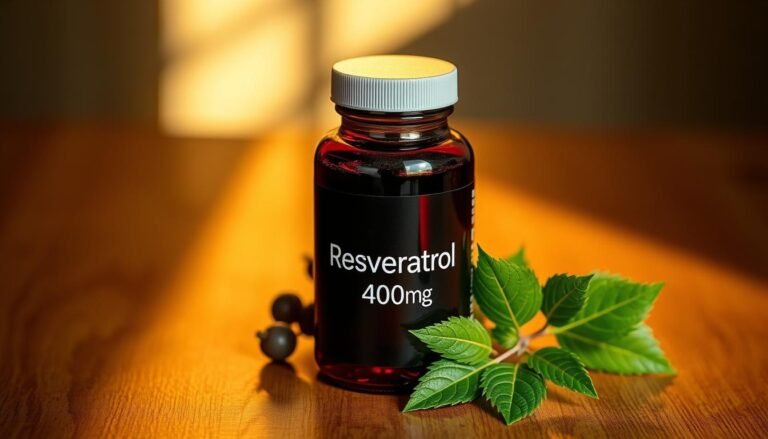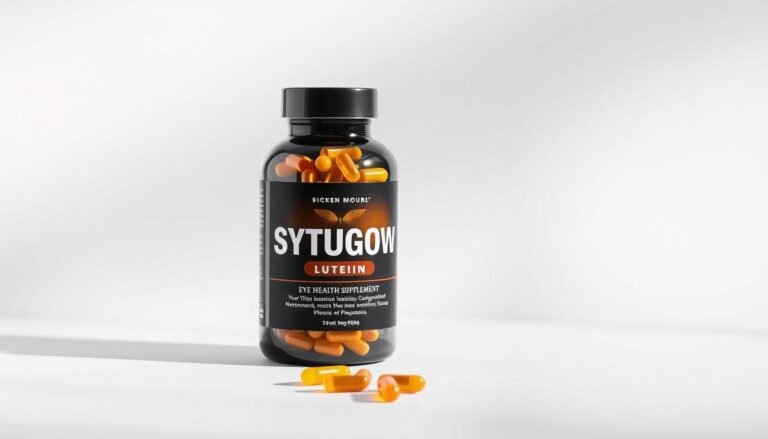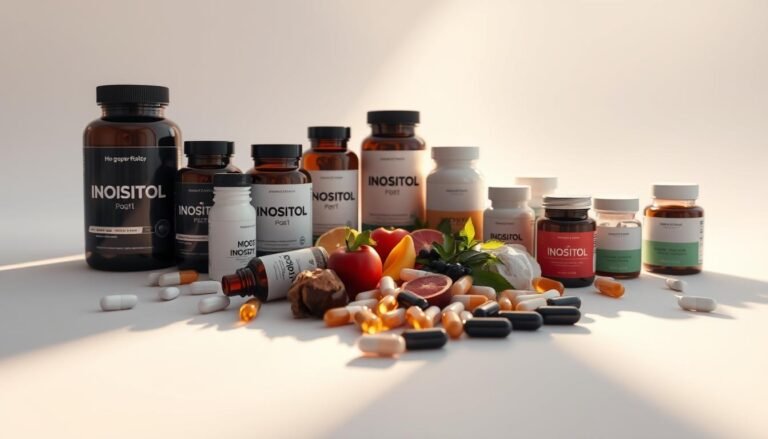Vitamin D 50000 IU: Power Dose for Bone Health
Table of Contents
Vitamin D is key for strong bones. The 50000 IU supplement is a strong way to fight severe deficiencies. It helps meet your body’s basic nutritional needs.
Today’s lifestyle often keeps us indoors, away from the sun. This means less vitamin D for our bodies. Taking a vitamin D supplement is important to fill this gap.
High-dose vitamin D can change how we think about health. It helps with bone health and boosts our immune system. This supplement offers many benefits beyond just nutrition.
Key Takeaways
- Vitamin D 50000 IU provides an intensive nutritional boost
- High-dose supplements address critical deficiency concerns
- Modern lifestyles often limit natural vitamin D production
- Proper supplementation supports bone and immune health
- Consulting healthcare professionals ensures safe dosage
What is Vitamin D and Why is it Important?
Vitamin D is a key nutrient for your health. It’s often called the “sunshine vitamin.” It helps your body in many ways, not just for bones.
It’s important for your body to work well. If you don’t have enough vitamin D, your body can suffer.
The Role of Vitamin D in the Body
Vitamin D does many important things:
- Helps your bones and teeth stay strong
- Boosts your immune system
- Reduces inflammation
- Helps cells grow
- Improves muscle and nerve function
- Manages blood sugar levels
Sources of Vitamin D
There are many ways to get vitamin D:
- Sunlight exposure: Your skin makes vitamin D from sunlight
- Fatty fish like salmon and mackerel
- Fish liver oils
- Egg yolks
- Fortified dairy products
- Dietary supplements
It’s important to know if you have a vitamin D deficiency. Some people might need more vitamin D to stay healthy.
Understanding Vitamin D Dosage
Finding the right vitamin D dosage can be tricky. Your body’s needs change based on age, lifestyle, and health. Knowing the right amount is key for staying healthy.
Vitamin D needs vary by age and health. The usual guidelines are a good start, but everyone is different.
Recommended Daily Allowance
Here are the typical vitamin D doses:
- Adults aged 19-70: 600 IU (15 mcg) daily
- Adults over 70: 800 IU (20 mcg) daily
- Pregnant and breastfeeding women: 600-800 IU
Understanding Safe Dosage Limits
While vitamin D is good, too much is bad. Experts say too much can harm you. Most adults should not take more than 4,000 IU a day.
Serum concentrations above 125 nmol/L (50 ng/mL) may lead to adverse health effects.
Your vitamin D needs can change based on:
- Skin pigmentation
- Sun exposure
- Geographic location
- Existing health conditions
Always talk to a doctor to find the right vitamin D dose for you.
Benefits of Vitamin D 50000 IU
Vitamin D supplements are key for your health. Taking high doses of vitamin D can offer big benefits, but only with a doctor’s advice. Knowing the good things about this vitamin D supplement helps you choose the right nutrition.
Vitamin D does more than just feed your body. It’s a strong helper for your body’s main systems.
Stronger Bones and Teeth
Vitamin D is vital for your bones. It helps your body absorb calcium and build strong bones. This is key to avoiding bone diseases like osteoporosis.
- Promotes optimal calcium absorption in the gut
- Helps maintain adequate bone mineral density
- Reduces risk of fractures in older adults
- Supports tooth strength and overall dental health
“Vitamin D is not just a vitamin, but a critical hormone that influences multiple body systems.” – National Institutes of Health
Support for Immune Function
Vitamin D supplements boost your immune system. Studies show that enough vitamin D helps control immune reactions and lower inflammation.
- Enhances immune cell production
- Helps modulate inflammatory responses
- May decrease risk of autoimmune conditions
- Supports overall immune system resilience
Note: Always talk to a healthcare professional before starting high-dose vitamin D. Make sure it’s right for you.
Who Should Consider Vitamin D 50000 IU?
It’s important to know your vitamin D levels for good health. Not everyone needs a lot of vitamin D. But some groups might really benefit from it.
Individuals at Risk of Vitamin D Deficiency
Some people are more likely to have low vitamin D. Key risk factors include:
- Limited sun exposure
- Dark skin pigmentation
- Obesity
- Advanced age
- Chronic medical conditions
Special Populations Needing Careful Monitoring
Some groups need to watch their vitamin D levels closely:
- Older Adults: Less skin synthesis and less outdoor time
- Individuals with malabsorption disorders
- People taking medications affecting vitamin D metabolism
- Patients with autoimmune diseases
“Knowing your vitamin D status can be a game-changer for your overall health and wellness.” – Nutrition Experts
Studies show big differences in bone health with vitamin D. A study found that high-dose vitamin D helped keep bones stronger than low-dose.
Before starting high-dose vitamin D, talk to your doctor. They can check your levels and suggest what’s best for you.
How to Take Vitamin D 50000 IU
Using a high-dose vitamin D supplement needs careful thought. Knowing how to take it can help you get the most benefits. But, it’s also important to avoid risks.
When you start taking a vitamin D supplement, pay attention to a few things. Your body handles vitamin D differently based on its form and how you take it.
Best Practices for Supplementation
- Choose vitamin D3 over D2 for better absorption
- Take your vitamin D supplement with a meal containing healthy fats
- Maintain consistent intake as recommended by your healthcare provider
- Consider weekly high-dose supplements versus daily low-dose options
Potential Side Effects
Vitamin D supplements are good, but too much can cause problems. Knowing the side effects helps you choose the right dose.
- Watch for signs of vitamin D toxicity
- Monitor calcium levels in your blood
- Schedule regular blood tests to check vitamin D concentrations
- Consult your doctor if you experience persistent symptoms
Potential side effects include:
- Nausea
- Weakness
- Kidney problems
- Excessive calcium in the blood
Always talk to a healthcare professional. They can help you find the best vitamin D supplement for your health.
Vitamin D 50000 IU in Food Sources

It’s hard to get enough vitamin D from food alone. While some foods have vitamin D, they don’t always give you enough. Knowing the best natural and fortified sources can help you get more vitamin D.
Natural Powerhouse Foods
Some foods are packed with vitamin D. Your top choices include:
- Fatty fish (salmon, mackerel, tuna)
- Fish liver oils
- Beef liver
- Egg yolks
- UV-exposed mushrooms
Fortified Food Options
Many foods are fortified with vitamin D to help you get enough. Look for these vitamin D-rich options:
- Milk and dairy products
- Plant-based milk alternatives
- Orange juice
- Breakfast cereals
- Yogurt
Even with these foods, you might still need a vitamin D supplement. Especially if you have a big deficiency. Talking to a doctor can help you find the right mix of food and supplements for your vitamin D needs.
The Connection Between Vitamin D and Calcium
It’s important to know how vitamin D and calcium work together for strong bones. These two nutrients are a team that helps keep your bones strong and your body healthy.
How Nutrients Collaborate for Bone Health
Vitamin D is key for your body to use calcium from food. Without enough vitamin D, your body can’t absorb calcium well. This can weaken your bones and cause health problems.
- Vitamin D helps your intestines absorb calcium more efficiently
- Promotes calcium transport in the bloodstream
- Supports bone mineralization processes
Importance for Bone Density
Keeping vitamin D and calcium levels right is vital for bone health. As you get older, your body absorbs these nutrients less. Bone density depends on a delicate balance of these critical nutrients.
The synergy between vitamin D and calcium is a key factor in maintaining strong, healthy bones throughout your lifetime.
Vitamin D does more than just help bones. It also boosts your immune system and overall health. Checking your vitamin D levels helps you meet your body’s nutritional needs and avoid deficiencies.
Supplements vs. Natural Sources
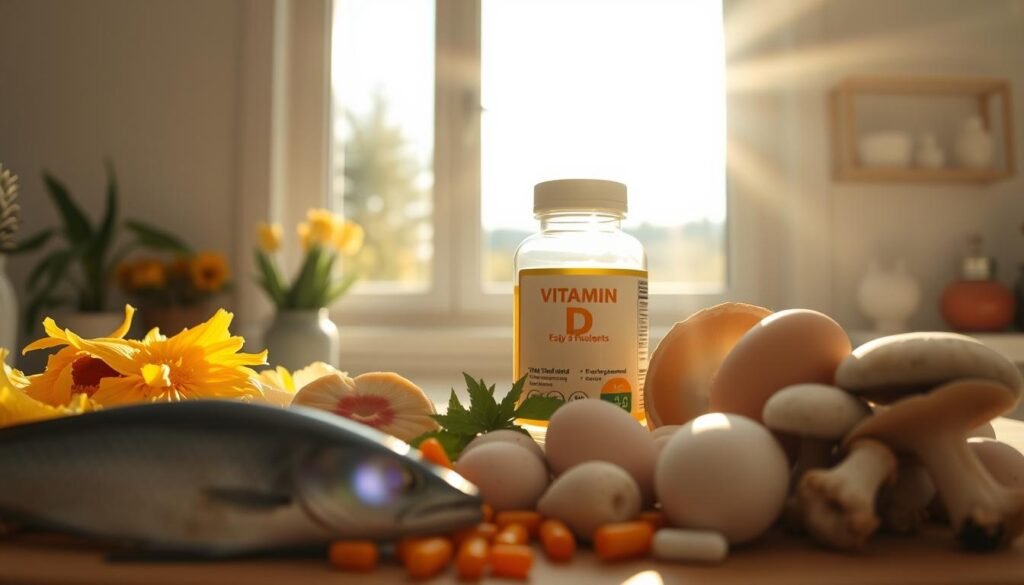
Finding the right vitamin D can be tough. Your body needs it, but choosing between supplements and natural sources is key.
Knowing the good and bad of each source helps you choose wisely. This way, you can keep your vitamin D levels just right.
Exploring Supplement Benefits
Vitamin D supplements have some big pluses:
- You can control how much you take.
- They’re great for those who don’t get much sun.
- They help you keep your vitamin D levels steady all year.
- They’re perfect for people who can’t eat certain foods.
Natural Source Advantages
Natural vitamin D sources have their own perks:
- Getting some sun helps your body make vitamin D.
- Whole foods give you extra nutrients.
- They help you avoid taking too much vitamin D.
- They offer a more natural way to get nutrients.
Finding Your Optimal Balance
Your best vitamin D plan depends on your life, diet, and health. Mixing supplements with natural sources is a smart move for full nutrition.
Ask your doctor to find the best vitamin D plan for you.
Conclusion: Making an Informed Choice
Understanding vitamin D needs is key to good bone health. It’s not just about taking a high-dose supplement. Personalized approaches are vital for the best results, as guidelines suggest.
Getting advice from healthcare professionals is crucial when considering vitamin D supplements. They can check your vitamin D levels with blood tests and look at risks. They’ll help decide if a 50,000 IU dose is right for you.
Good bone health involves more than just vitamin D. Regular exercise, eating right, and lifestyle changes are also important. Your doctor can create a plan that covers all aspects of your health, including vitamin D.
Remember, nutrition and supplements must fit your needs. Working with doctors and staying up-to-date on vitamin D advice helps you make smart choices. This supports your health and well-being for the long term.

